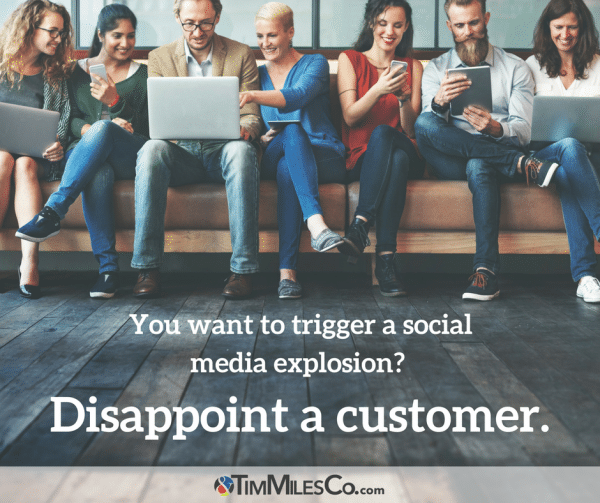It’s like the company-that-shall-not-be-named… it’s very utterance puffs cheeks and turns faces red.
The “C” word… is NOT for use in civil conversation.

Consistently ranked one of the most hated companies in America (Google “Comcast worst company America” and you’ll get 278,000 results, but hey! Great news for Comcast, according to Consumerist, they’re no longer the absolute worst of the worst.) They’re famous for disappointing customers.
That’s probably too mild, huh? It’s probably the wrong “F” word for most people.
Or is it?
Truth is, Comcast has millions of customers, and we only hear a select few stories of outrage. The customer/rage ratio is likely low, but when we hear about their disappointing customer service, boy, do we hear about it.
That’s your first lesson.
Squeaky wheels demand grease, and when they don’t get greased, they squeak louder and louder and louder. Social media has provided them an amplifier of unprecedented volume and duration. Stories of poor customer service last forever.
You want to trigger a social media explosion? Disappoint a customer. In a 2013 study, Accenture found angry customers cost companies $5.9 trillion dollars. That’s $5,900,000,000,000!
Bottom line: poor customer service hurts your bottom line.

The Second Lesson.
Happy customers are, by and large, content customers… meaning, they’re not anywhere near as likely to leave reviews as “F” word customers.
This is just as true for your company as it is Comcast, though not to such a large degree.
Do you have a process in place for (a) asking for reviews, and (b) making it easy for your customers to leave you reviews? Ryan and Dee on our team have been working on just such a system, and we’ve been discussing it with a small number of our clients before rolling it out to all them. We’re very excited.
How can you reduce the friction between your customer and a good/great/ breathtakingly awesome review?
The Third—and most important—Lesson.
Why was our experience with Comcast so good?
We had paid to upgrade our Internet. Our business does, on average, a dozen video conferences each week, and it’s a necessary expense for us to have a huge, heaping pile of bandwidth to push and pull those audio and video signals in their best possible resolution. It’s a currency of our credibility.
Without getting too technical, we were getting “okay fast” Internet {100 Mbps down / 20 up), but (thanks to new competition) they were offering “paisley speed” Internet (250 Mbps down/40 up), and it was perfect for us.
We called Comcast service, and the technician came to our home, and it soon became clear it wasn’t a simple process for him. Something was wrong.
What happened over the next two hours was the lesson.
Our problem… became *his* problem.
He was more frustrated than us. He owned that problem, and he did not quit until he had found a solution. This required him to test and try (as I said) a couple hours worth of solutions. He tested every link in the chain, and he stayed until he could look us in the eye and assure us he’d fixed what needed fixed.
It involved poor wiring outside our home and a bad modem inside our home.
He did so without complaint; he did so with Sherlock-Game-Is-Afoot enthusiasm.
Wasn’t he just doing his job?
Sure. You could certainly say that with truth… and leave it at that…
But Comcast is (in)famous for not “just doing their job”, aren’t they? They pass more bucks than a Johnson County, Illinois deer processing stand. And that’s one of my problems:
There is no they. Comcast is a company of mostly hard-working, diligent, caring people, just like your company.
One of those people came to our home and made our problem his problem.
That sense of ownership – him not saying “Well, you’re going to need to talk to someone else at Comcast,” or some such thing – is what I took away from our experience with his company.
Do your employees own their customers’ problems?
Do they do so without complaint?
Do they attack those problems with Sherlock-The-Game-Is-Afoot curiosity, intensity, and relentlessness?
Do you reward them for doing so?
See… I think that might be Comcast’s problem… or one of them…
Did I leave them a review?
Nope. They never asked me. (See also: The Second Lesson)
Hopefully one day, Comcast will ask us about The First Order of Business.
- When Big Guys Get Loud, Small Businesses Should Listen Quietly - August 13, 2025
- Three Lessons From A GOOD Comcast Service Story - March 30, 2021
- A Shockingly Accurate Way To Calculate Your Market Share - March 16, 2021
